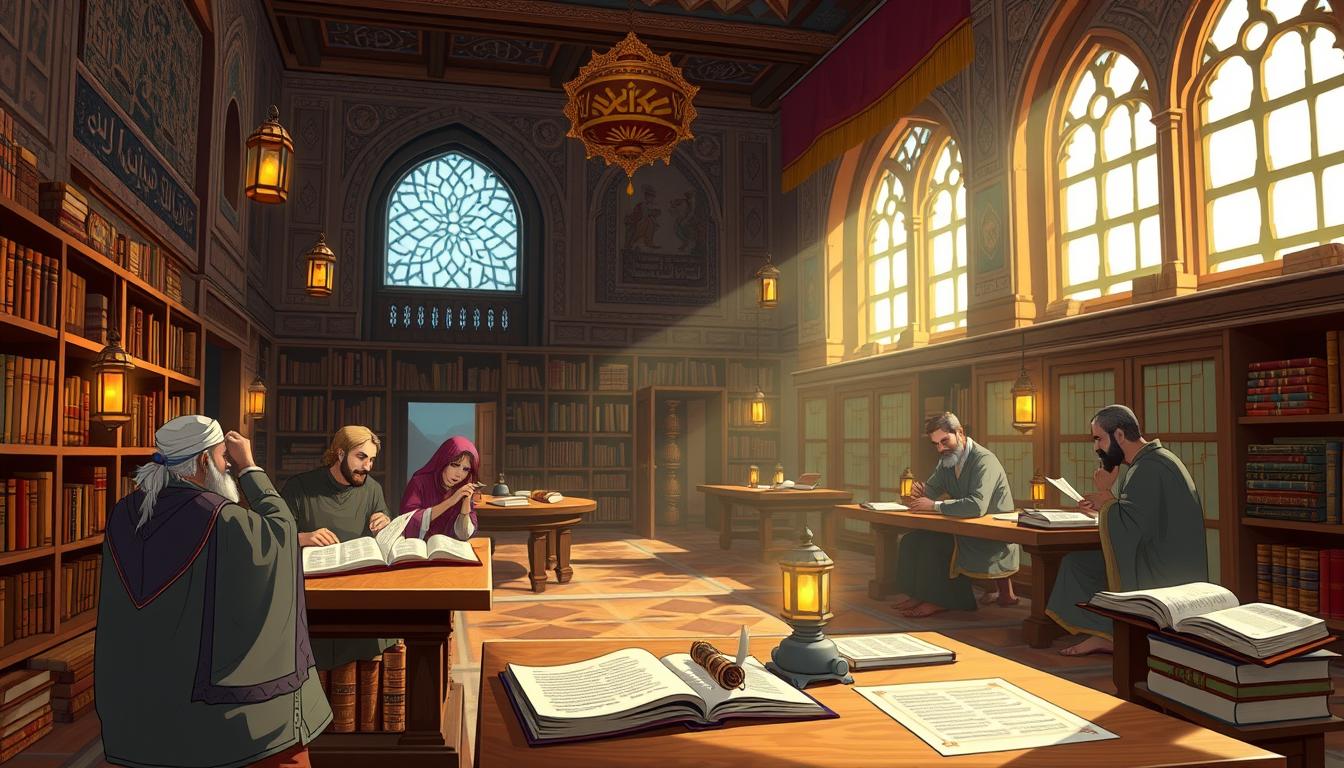10 Great Muslim Scholars Everyone Should Know
Ever thought about who made the Islamic Golden Age so special? These scholars changed the game in medicine, math, philosophy, and astronomy. Their work still shapes our world, but many don’t know about these geniuses.
Islam, the fastest-growing religion, owes a lot to its brilliant thinkers from the Islamic Golden Age. These minds transformed science, medicine, and literature. They left a mark on global history that’s still felt today.
Ibn Sina’s medical texts and Al-Khwarizmi’s algebra are just the start. These scholars expanded our understanding of the world. They built on ancient Greek and Roman knowledge, shaping Islamic thought and beyond.
Key Takeaways
- Islamic scholars made significant contributions to various fields of study
- The Islamic Golden Age saw a flourishing of intellectual pursuits
- Many Muslim thinkers are considered “fathers” of modern disciplines
- Their work influenced both Eastern and Western intellectual traditions
- The impact of these scholars extends far beyond the Islamic world
The Islamic Golden Age: A Time of Intellectual Flourishing
The Islamic Golden Age lasted from the 8th to the 13th century. It was a time of great intellectual growth. Eminent Muslim philosophers and celebrated Muslim scientists made big contributions to the world’s knowledge.
The Rise of Islamic Scholarship
Islamic scholarship grew a lot during this time. The House of Wisdom in Baghdad was set up in 825. It became a center for learning and translation, keeping and adding to ancient wisdom.
The introduction of paper in the 10th century changed how knowledge spread. It made it easier to create and share manuscripts.
Key Factors Contributing to the Golden Age
Several things helped spark this intellectual boom. The Translation Movement, backed by caliphs, helped save ancient works. Scholars translated Greek texts into Arabic, saving them from being lost.
They also created ways to copy manuscripts quickly. This helped spread knowledge faster.
Impact on Global Knowledge and Civilization
The Islamic Golden Age had a big impact on many areas. Muhammad ibn Mūsā al-Khwārizmī made big steps in algebra. Scholars also organized Greco-Roman medical knowledge into big books.
The arts also grew, with better ceramics, metalwork, and calligraphy. This rich knowledge helped both Islamic and Western thought for many years.
“The Islamic Golden Age was a beacon of knowledge that illuminated the path for future generations.”
Ibn Sina (Avicenna): The Prince of Physicians
Ibn Sina was born in 980 AD near Bukhara. He is one of the most famous Muslim scholars. His work in medicine and philosophy made him known as the “Prince of Physicians.”
Contributions to Medicine and Philosophy
Ibn Sina was incredibly talented. He wrote nearly 450 works, with 240 still alive today. His writings covered many areas, like medicine, philosophy, astronomy, and theology.
The Canon of Medicine: A Cornerstone of Medical Education
“The Canon of Medicine” was Ibn Sina’s greatest work. It’s a five-book encyclopedia that talks about 760 drugs and more. It was the top medical book in Europe and the Islamic world for many years.
- First Latin translation in the 12th century
- 15 Latin editions and 1 Hebrew edition in the late 15th century
- Translated into Persian, Chinese, German, French, and English
Influence on Western Thought and Science
Ibn Sina’s ideas deeply influenced Western thought. He knew about the contagious nature of tuberculosis and how diseases spread through water and soil. He also linked psychology and health in his work.
“The Canon of Medicine set the standards for medicine in Europe and the Islamic world.”
Today, Ibn Sina’s works are studied at top places like UCLA and Yale University. This shows his lasting impact on medicine and philosophy.
Al-Farabi: The Second Teacher
Al-Farabi was born in 870 CE in Farab, Kazakhstan. He is known as one of the most respected Muslim polymaths. His work in philosophy, politics, and science made him “The Second Teacher” after Aristotle.
In his 80-year life, Al-Farabi wrote 117 books. His writings covered many subjects, like 43 on logic and 11 on metaphysics. This showed his wide knowledge and skill.
Al-Farabi sought knowledge in Damascus, Egypt, Baghdad, and Aleppo. In Baghdad, he studied with top scholars of the Abbasid Caliphate. His travels and studies gave him a unique view, mixing Greek philosophy with Islamic thought.
His famous work is Ara Ahl al-Madina al-Fadila (The Model City). This book talks about his idea of the perfect state. It made him a key figure in Muslim political philosophy. His ideas also influenced thinkers like Ibn Sina and Ibn Rushd.
“The Virtuous City is like a perfect and healthy body, all of whose limbs cooperate to make the life of the animal perfect and to preserve it in this state.”
Al-Farabi’s influence wasn’t just in philosophy. His Kitab al-Musiqa (The Book of Music) was important in music theory. He also made big steps in logic, dividing it into two parts: Takhayyul (idea) and Thubut (proof).
His impact is still felt today. In 1975, the USSR honored him with a stamp for his 1100th birthday. This shows his lasting effect on world knowledge.
Ibn Rushd (Averroes): The Great Commentator
Ibn Rushd was born in 1126 in Córdoba. He is one of the 10 great Muslim scholars everyone should know. Known in the West as Averroes, he made big contributions to philosophy, medicine, and law.
Harmonizing Faith and Reason
Ibn Rushd’s grandfather was a respected judge in the Mālikī school. This influenced his early education. Averroes believed faith and rational thought could go together.
His work “The Decisive Treatise” explored this idea. It sparked debates that still go on today.
Commentaries on Aristotle
Averroes earned the title “The Great Commentator” for his work on Aristotle. He wrote three types of commentaries: short, middle, and long. These works made complex ideas easier to understand.
They played a big role in keeping Greek philosophy alive.
Influence on European Renaissance
Despite being condemned by the Catholic Church in 1270 and 1277, Averroes’s ideas greatly influenced Europe. His medical text, “Al-Kulliyat fi al-Tibb,” was a key textbook in Europe for centuries.
Averroes also made important contributions to medicine. He came up with a new theory of stroke and described symptoms of Parkinson’s disease.
“The ignorant man is not free.”
Ibn Rushd’s legacy as a top Islamic scholar goes beyond his time. He shaped philosophical discussions across cultures and centuries.
10 Great Muslim Scholars Everyone Should Know
The Islamic world has given us many influential thinkers. They have shaped knowledge in various fields. These scholars have left a lasting impact on history, science, and philosophy. Let’s look at ten great Muslim scholars whose work still inspires and educates us today.
Ibn Sina, known as Avicenna in the West, was a true polymath. He excelled in medicine, philosophy, and theology. His “Canon of Medicine” was a key text in medical education for centuries. Al-Farabi, called “The Second Teacher” after Aristotle, made big strides in logic and political philosophy.
Ibn Rushd, or Averroes, worked to blend faith and reason. His work influenced both Islamic and Western thought. Ibn Khaldun was a pioneer in sociology and historiography. Al-Ghazali’s critique of Greek philosophy reshaped Islamic theology.
- Ibn Taymiyyah: Reformed Islamic jurisprudence
- Ibn Kathir: Renowned for Quranic exegesis
- Al-Tabari: Wrote comprehensive historical and Quranic commentaries
- Al-Razi: Made groundbreaking discoveries in medicine and chemistry
- Al-Biruni: Advanced astronomy, mathematics, and natural sciences
These scholars’ works cover a wide range of subjects, from medicine to philosophy. They show the vast knowledge of the Islamic Golden Age. Their ideas still influence research and academic discussions in many fields today.
Al-Ghazali: The Proof of Islam
Al-Ghazali was born in 1058 in Tus, Iran. He became one of the most important Muslim philosophers of the Islamic Golden Age. His work made him a celebrated scientist, earning him the title “The Proof of Islam.”
Critique of Greek-influenced philosophy
Al-Ghazali’s famous work, “The Incoherence of the Philosophers,” challenged Greek-influenced Islamic philosophy. This critique started debates among scholars and changed Islamic thought. His intellectual strength led him to question his teachings, causing a spiritual crisis in 1095.
Contributions to Islamic theology and mysticism
After adopting an ascetic lifestyle, Al-Ghazali combined Sufi mysticism with orthodox Islam. His work “The Revival of Religious Sciences” highlighted the need for a pure heart and soul in fulfilling religious duties. He listed ninety-nine names of God and emphasized the golden rule of loving for others what one loves for oneself.
The Incoherence of the Philosophers: A landmark work
This groundbreaking text critiqued the ideas of earlier Muslim philosophers influenced by Greek thought. It sparked intense debates and influenced later thinkers like Ibn Rushd, Maimonides, and Thomas Aquinas. Al-Ghazali’s work continues to shape Islamic intellectual discourse, making him one of the most influential Muslim scholars in history.
“The purpose of life is to attain happiness by achieving perfection in knowledge and good deeds.” – Al-Ghazali
Ibn Khaldun: Father of Sociology
Ibn Khaldun was born in 1332 in Tunis. He is one of the most important Muslim scholars in history. His book, “Muqaddimah,” started sociology and new ways to study history.
Ibn Khaldun was more than a theologian. He looked at how societies grow and decline. His ideas, like the cycle of civilization, inspired thinkers like Auguste Comte and Arnold Toynbee.
His life was filled with politics and job changes. He worked in North Africa and even went to Granada on diplomatic missions. These experiences gave him a special view of society and history.
“Civilization and its well-being, as well as business prosperity, depend on productivity and people’s efforts in all directions in their own interest and profit.”
Ibn Khaldun also made big contributions to economics. He came up with the labor theory of value, showing how work creates wealth. This idea was ahead of Adam Smith’s by nearly four centuries, making him a key figure in economic thought.
- Analyzed factors affecting labor earnings
- Explored the relationship between town affluence and wages
- Distinguished between types of earnings (ribh and kasb)
Ibn Khaldun’s work still shapes social sciences today. His insights into history and society are still important. This makes him a giant among Muslim scholars.
Al-Khawarizmi: The Father of Algebra
Muhammad ibn Musa al-Khwarizmi was born around 780 CE. He is one of the most respected Muslim polymaths in history. His work in mathematics and astronomy helped start modern science.
Contributions to Mathematics and Astronomy
Al-Khwarizmi is known for his work in algebra. His book “Al-Jabr” introduced algebraic methods and named the field. He solved equations using six standard forms, with operations like al-jabr and al-muqābala.
In astronomy, Al-Khwarizmi created a set of astronomical tables (Zīj) from Hindu and Greek sources. He made big steps in trigonometry, making accurate sine and cosine tables, and the first table of tangents.
The Concept of Algorithm and Its Modern Implications
The word ‘algorithm’ comes from Al-Khwarizmi’s name. His book “Algoritmi de numero Indorum” introduced Hindu-Arabic numerals to the West. This changed arithmetic and helped start computer science and programming.
Influence on the Development of Scientific Methods
Al-Khwarizmi’s work had a huge impact on science. He helped measure Earth’s circumference and supervised a project to make a world map. His books were key in European universities until the 16th century, influencing many scholars.
“The importance of al-Khwarizmi’s contributions to mathematics cannot be overstated.”
Conclusion: The Enduring Impact of Muslim Scholars
The 10 Great Muslim Scholars Everyone Should Know have made a lasting impact on human knowledge. They made significant contributions in science, philosophy, and medicine. Their work laid the groundwork for many modern discoveries.
Ibn Sina’s Canon of Medicine is a prime example. It was a key guide in medicine for centuries in both Islamic and European worlds. Al-Khwarizmi’s work in algebra also changed mathematics, impacting the European Renaissance and the scientific method.
Al-Razi’s medical encyclopedia and Ibn al-Haytham’s work in optics are just a few examples. Their contributions in astronomy, chemistry, and engineering still influence science today. Their legacy shows the power of curiosity and the universal nature of knowledge.
Source Links
- Top 20 Islamic Scholars in History: Work and Impact
- List of Islamic scholars described as father or founder of a field
- 10 Golden Age Philosophers, and Why You Should Know Them
- Islamic Golden Age
- The Islamic Golden Age | World Civilization
- Ibn Sina (Avicenna): The Prince Of Physicians
- The Air of History (Part V) Ibn Sina (Avicenna): The Great Physician and Philosopher
- Abu Al-Nasr Al-Farabi: The Second Teacher – IslamOnline
- Al-Farabi: The Second Teacher and His Lasting Philosophical Legacy
- al-Farabi
- Ibn Rushd [Averroes]
- Averroes
- » 5 Influential Muslim Philosophers You Should Know About
- 5 Muslim scientists to teach your kids about
- Scholars – Muslim Heritage
- Al-Ghazali
- Al-Ghazali and the Golden Rule: Ethics of Reciprocity in the Works of a Muslim Sage | Yaqeen Institute for Islamic Research
- History of Muslim Philosophy: Al-Ghazali Life and works
- Ibn Khaldūn | 14th Century Muslim Historian & Philosopher | Britannica
- Ibn Khaldun
- "Ibn Khaldun, the Father of Economics"
- Al-Khwarizmi | Biography & Facts | Britannica
- Al-Khwarizmi
- Top 8 facts about the Islamic mathematician Al Khwarizmi | Mathematics
- Historical Contributions of Muslim Scholars – GlobalSadaqah.com Blog
- Why We Need Ulama: The Importance of Seeking Islamic Knowledge From Scholars | Yaqeen Institute for Islamic Research
- Islamic Golden Age | Islamic History







